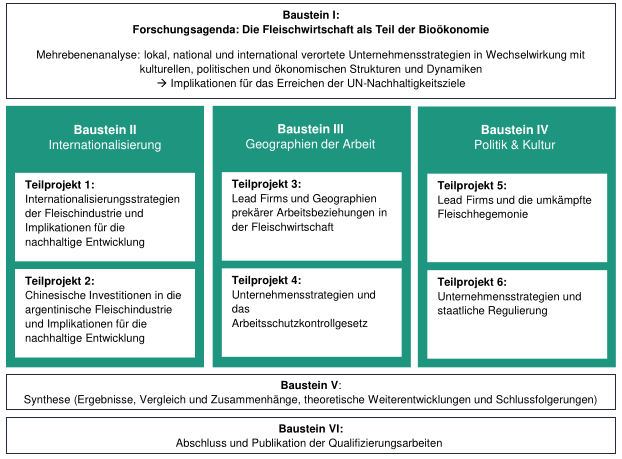Research agenda (pillar I)
The meat industry as a part of the bioeconomy: internationalization, geographies of labor, and hegemonic strategies
Bioeconomic strategies generally aim to generate and exploit biogenic resources in economically and socioeconomically sustainable ways. Profound social changes are necessary to achieve these goals.
The meat industry, a major part of the German food economy, is a core factor of the bioeconomy. Globally speaking, it will continue to grow economically and, in the past few years, it has already become a source of social debate. Concerns include, for example, labor conditions for migrant workers, the treatment of animals, the ecological and health consequences of husbandry, and the policies regulating these areas. The impact of global meat-related value-creation chains on local production and nutrition is also an important area of research.
Against this backdrop, our junior research group is looking at the following questions:
- What strategies do corporations in the meat industry use in the various fields of activity that are also relevant for sustainable development, and what are their standards?
- How are these strategies designed against the backdrop of political and economic developments and in relation to state and civic stakeholders?
- What are the conditions required for implementing the UN’s Sustainability Goals in the area of bioeconomy?
We will explore these questions in 6 subprojects in 3 thematic building blocks. Find out more on this page (see figure below). We focus on corporate strategies in conjunction with economic structures and social, political, and cultural relations. Theoretically, our approach is based on methods in political economics, sociology of work, and research on geographic inequality and hegemony.
Our understanding of sustainability implies the sound regulation of the relationship between people and between people and nature (meaning also animals). It allows everyone dignified and just working conditions and production, reproduction, and consumption. The project integrates different sustainability-related dimensions: economic-geographical strategies as well as strategies in the areas of labor, policy, and culture.
The junior research group is based at the Institute of Geography in the Department of Earth System Sciences at Universität Hamburg. It is funded by the Federal Ministry of Education and Research as part of its program to support Bioökonomie als gesellschaftlicher Wandel junior research groups.
Project duration: 2023–2028

